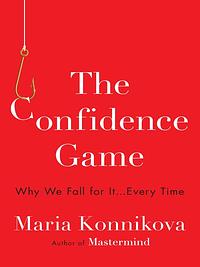Take a photo of a barcode or cover
A solid if unspectacular read about conmen and why long cons work. Like a lot of pop nonfiction, it's high on small stories and short on details, and thus I felt like this was lacking what I was looking for in the topic even though I had a good feeling going in that it would be exactly this.
Much like any other book like it, if you know you have an interest in the subject but little knowledge, this is good. If you want more in depth, there might be other books out there to pick up.
Much like any other book like it, if you know you have an interest in the subject but little knowledge, this is good. If you want more in depth, there might be other books out there to pick up.
I was drawn to this book because I recently came thisclose to buying into a multi-level marketing scheme and, as a result, felt compelled to learn more about why we are all susceptible to manipulation and persuasion by con artists. I thought Maria Konnikova's explanations of the psychology and methods of cons/scams were engaging and well-researched. I particularly enjoyed the detailed true stories of cons, both recent and historic, and Konnikova's ability to link her findings to general statements about human nature. While other reviewers have (fairly) criticized Konnikova's writing for being repetitive and hard to follow, I was impressed by how much she has improved since writing Mastermind.
Main takeaway:
"Con artists, at their best and worst, give us meaning. We fall for them because it would make our lives better if the reality they proposed were indeed true. The give us a sense of purpose, of value, of direction... Ultimately, what a confidence artist sells is hope. Hope that you'll be happier, healthier, richer, loved, accepted, better looking, younger, smarter, a deeper, more fulfilled human being–hope that the you that will emerge on the other side will be somehow superior to the you that came in."
Main takeaway:
"Con artists, at their best and worst, give us meaning. We fall for them because it would make our lives better if the reality they proposed were indeed true. The give us a sense of purpose, of value, of direction... Ultimately, what a confidence artist sells is hope. Hope that you'll be happier, healthier, richer, loved, accepted, better looking, younger, smarter, a deeper, more fulfilled human being–hope that the you that will emerge on the other side will be somehow superior to the you that came in."
I really enjoyed this, it's not always full of detail about each aspect of the psychology, but it's an excellent jump off point with lots of cases, both academic and anecodtal which will prompt lots of future reading and thought.
funny
informative
inspiring
mysterious
medium-paced
Great dive into social engineering and the art of the con. Konnikova does it again with this one (makes up for the Sherlock Holmes book lol). The info didn't really stick but there were a lot of good stories.
Super interesting, mildly terrifying. Terrifying because I could totally see myself falling for one of the cons, but hopefully I’ll be a bit better prepared now that I know more about the logic/tricks behind a con.
I found this book to be a bit of a slower read than The Biggest Bluff. I felt it was more of a collection of similar stories rather than one story leading up to a main event. Despite that, I think this has grown to be one of my favorite books because of everything it has taught me about recognizing, understanding, and avoiding con artists.
To the best of my knowledge, I have never been conned, but that's only to the credit of the grifters that got me. This is not a history of con artistry or an inventory of confidence tricks, but an examination of the psychology behind why we are all (yes, all, no matter how cynical or intelligent) susceptible to being conned. The purpose of the book, Konnikova writes, is to help people better understand what makes us fall for cons and how we can protect ourselves against them. In broad strokes (spoiler, I guess): don't succumb to high pressure Asks, understand what triggers you to have an emotional response over a cognitive one, set limits for yourself, study common cons and be aware of the signs, and have people you trust to tell you when you are being irrational. I highly recommend it to everyone.
informative
medium-paced
Very interesting and worth a read, though the prose is a bit melodramatic in places.
A great reminder that human beings are suckers for a good story.

